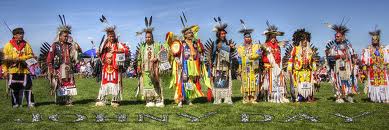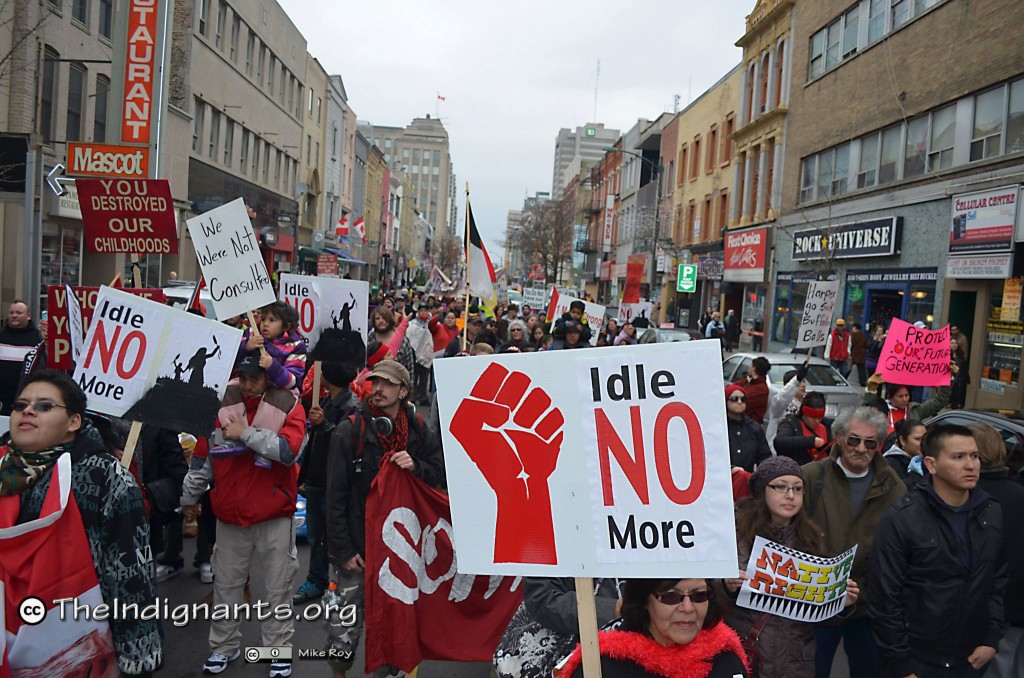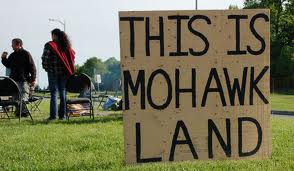 By Ray Rivers
By Ray Rivers
August 15, 2015
BURLINGTON, ON.
When the UN adopted the Declaration on the Rights of Indigenous Peoples (UNDRIP), enshrining their minimal standards for the survival, dignity and well-being, in 2007, only four nations opposed its passage. These were the former British colonies of Canada, Australia, New Zealand and the USA. Canada’s minister of Indian Affairs at the time Chuck Strahl, argued: “By signing on, you default to this document by saying that the only rights in play here are the rights of First Nations. And, of course, in Canada, that’s inconsistent with our Constitution.”
 Yet Canadian aboriginal and government officials had been engaged in the development of this declaration since the 1970’s. Amnesty International, condemned the Conservative government’s position as they argued that the UNDRIP outlined minimum human rights standards, complementing rather than overriding existing rights. In fact, over a hundred Canadian lawyers and legal experts prepared an open letter outlining why the Canadian government’s claims were misleading.
Yet Canadian aboriginal and government officials had been engaged in the development of this declaration since the 1970’s. Amnesty International, condemned the Conservative government’s position as they argued that the UNDRIP outlined minimum human rights standards, complementing rather than overriding existing rights. In fact, over a hundred Canadian lawyers and legal experts prepared an open letter outlining why the Canadian government’s claims were misleading.
And it was only three years later that all four of the dissenting nations reversed themselves and ratified the Declaration, though their support could best be described as qualified. Canada and Australia, in particular, referred to the Declaration as some kind of aspirational document meanwhile insisting that their governments were already in compliance. It is said that if you don’t know that a problem exists, you will never come to a resolution.
Article 3 of UNDRIP includes the right to “to freely determine their political status and freely pursue their economic, social and cultural development.” Now that is pretty meaty stuff and something very much at odds with the paternalism that has characterized aboriginal policy over the centuries. Canada’s approach has always been assimilation or directed isolation – you are one of us or you are on the reserve and will play according to our rules.
Yet, Canada is the nation of multiculturalism. We encourage new immigrants to share their history and lifestyles with the rest of us as we continue to build Canada. Why do we treat immigrants as equals and our aboriginals as mis-guided children? The purpose of the Indian Act, first enacted almost immediately after confederation, was to encourage aboriginals to discard their history and embrace ours; to give up their cultural heritage as if it were obviously inferior.
Of course it’s not just about attitude, though it is a great deal about attitude. There are these historical treaties, and the new ones in the works, that continue to drive that wedge between us and them, to perpetuate the divisions. The Indian ‘status’ is a virtual prison sentence for Canada’s original inhabitants, segregating them from the rest of us. Conferring special rights (e.g. tax free), ‘status’ has perpetuated the demand for a system which has failed to provide economic and social development, and the freedom it purports to offer.
Like a treadmill or vicious circle, aboriginals are trapped in a dependency on public largess and welfare. What, arguably, may have been well-intentioned aboriginal policy at one time in history has been shown to be demeaning and de-humanizing. And the courts have told us we can’t just tear up the treaties, and the Indian Act, and start again, despite the overwhelming logic which says that is exactly what we need to do.
 Pierre Trudeau, in 1969, and Stephen Harper, more recently, learned that change is not something government can do on its own, it needs to engage all Canadians in a serious discussion. Boundaries and limits, as articulated in the old treaties, can both protect and imprison. Would the creation of aboriginal nations within the Canadian nation be a solution? Doesn’t that already exist with the system of reserves? Would that have served to prevent the conflicts at Caledonia, Ipperwash, Akwesasne and ‘Idle No More’?
Pierre Trudeau, in 1969, and Stephen Harper, more recently, learned that change is not something government can do on its own, it needs to engage all Canadians in a serious discussion. Boundaries and limits, as articulated in the old treaties, can both protect and imprison. Would the creation of aboriginal nations within the Canadian nation be a solution? Doesn’t that already exist with the system of reserves? Would that have served to prevent the conflicts at Caledonia, Ipperwash, Akwesasne and ‘Idle No More’?
The US government officially treats American tribes as ‘domestic dependent nations’ but has struggled in defining how these jurisdictions interact with federal, state, and tribal governments. It all sounds good until the rubber hits the road and everyone sees that this is nothing like the full sovereignty accorded foreign nations. The incident at Wounded Knee in 1973 exposed the limitations of the power of these Indian ‘nations’, when trying to exert some of the influence one would expect to have – as a nation. And that perhaps explains why those four former British colonies, unable to move beyond our 16th century First Nation’s policies, opposed the UN Declaration.
 There are no elegant solutions it seems, but the status quo is unsustainable, and we are not even talking about the real issues – the longer term place of aboriginals and their culture in Canada and among the rest of Canadians. We dance about, dealing with symptoms like the land claims or improving the education and health services on the reserves, as the Kelowna Accord was intended to do – good things nonetheless. And we pretend to worry about offending native culture, such as when a celebrity dons a warrior headdress, though like the feathered bonnet, so much of all of this is clouded in symbolism.
There are no elegant solutions it seems, but the status quo is unsustainable, and we are not even talking about the real issues – the longer term place of aboriginals and their culture in Canada and among the rest of Canadians. We dance about, dealing with symptoms like the land claims or improving the education and health services on the reserves, as the Kelowna Accord was intended to do – good things nonetheless. And we pretend to worry about offending native culture, such as when a celebrity dons a warrior headdress, though like the feathered bonnet, so much of all of this is clouded in symbolism.
 Ray Rivers writes weekly on both federal and provincial politics, applying his more than 25 years as a federal bureaucrat to his thinking. Rivers was a candidate for provincial office in Burlington where he ran against Cam Jackson in 1995, the year Mike Harris and the Common Sense Revolution swept the province.
Ray Rivers writes weekly on both federal and provincial politics, applying his more than 25 years as a federal bureaucrat to his thinking. Rivers was a candidate for provincial office in Burlington where he ran against Cam Jackson in 1995, the year Mike Harris and the Common Sense Revolution swept the province.
BACKGROUND LINKS:
UN Declaration Aboriginals Australia New Zealand USA
Indian Act Land Claims Indian Land Claims Conflict Assimilation
















This is you second article on this subject, Ray, and it was informative. But, again, I only learned what the government of Canada does or does not do, ditto the U.S. government, and now we have the ever helpful U.N. butting in. This is all top down discussion. You may decry paternalism in the Indian Act, but the thread of your analysis so far has also been paternalistic. Questions that needs to be answered: what do the Indians want, how do they see their future, how can we help them achieve their goals, etc.
Maybe before go running off ratifying treaties, proposing solutions to problems that we think are their problems, offering real foreign national status to Indian bands with 85 residents, we should ask them about these things. Why not have a Royal Commission on the future of Indians in Canada and get some real input? Didn’t we have a Royal Commission to delve into bilingual and bicultural affairs. I know we had a Royal Commission to poke into the future of the Toronto waterfront. Surely dealing with this vexing problem is as important as sorting out who gets to be the boss of the waterfront in Toronto.
Hi Ray great article and most informative. I found it too be much more informative than most things that have been printed during all of these years. When I first moved to Burlington there was no Burlington Mall. In it’s place was Fishers Farms where families of the first nations lived and worked. Some of the children went to school with my siblings. When the mall was built they were now unemployed and had to move elsewhere. Some of course returned to the Reservation and others lived in North Burlington. One of the boys was very involved in First Nations Affairs I am trying to find out just what. He passed away fairly young and I do not see his family. I will get back to you if I am able to find out. I also attended University with women who were first Nations and one became a Professor at McMaster. I have spoken to some who were placed in the residential schools. Without graphic detail this was an abomination and should never ever have happened. The gall of the immigrants who came here thinking to tell them how to live. Our way is Not the Best Way. Whose way is Best I would say it is a combination of the way of all peoples and the acceptance of what is good about their lives eg. following the Golden Rule of Do Unto Others As You
Would Have Them Do Unto You, The 10 Commandments, etc. These are the general principles of living a good life and respecting your fellow person. I have said before that if Canada is to have a second language why should it have been French and not one of the First Nations Languages? I think we should consider adopting one of them as a First Language. I also think that there should be a National Referendum on the Treatment of First Nations Peoples and How it should be Improved. It is Shameful in my opinion we as Canadians should be ashamed of how they have been treated. Anything I can do to help to improve their situation I will do. I am reading your links Ray there is a great deal of info. to go through. Thanks for bringing this issue forward.
“We encourage new immigrants to share their history and lifestyles with the rest of us as we continue”
Which can be a huge mistake. Who in their right mind wants the lifestyle of Sharia Law to be part of Canada? All cultures are equal, sounds so nice, but in the real world that isn’t true in all instances. Importing 7th century cultures, in mass, creates great turmoil as we are now seeing in numerous, and ever growing, no-go zones of, France, England, the Netherlands etc., etc.
Ray – I agree the current situation is not working. I will give you an example. We have a native customer who regularly frequents my business. In Ontario, Natives are entitled to an instant rebate of the PST portion of the HST charged in Ontario. So anyone who walks in with a native ID card, pays only 5% tax, not the 13% the rest of us pay.
This gent works at a fortune 50 company and earns well over $100k and lives local and saves 8% on everything he buys. On the other hand we have natives who live in Northern Ontario and live well below the poverty line. (why they stay in those isolated areas, is another long conversation). So the sasles tax laws in Ontario, treat both these natives equally. Federal rules around GST/HST are different when we ship goods direct to the reserve.
The tax exemption laws are flawed and do not serve the purpose they were created for. If the Government wants to subsidize these folks, then make it based on an income test and part of the income tax laws, not an across the board tax reduction on spending controlled through sales tax laws.
Really a mess, but no one wants to step up and fix it.
Enjoyed your article Ray.
As an ex- pat Anglo Quebecer, who grew up alongside the Kanesatake, this subject is one that is close to my heart.
I hope another article reminding readers about the findings in the UN Rappateur’s report is in the works as well.
Well done Ray!
Unfortunately most of us have a very poor grasp on the complexity of the problem of what our relationship should be with our indigenous peoples. You have made a start to help us get a better understanding of the problem. The current status quo is obviously not working. I hope you will come up with possible solutions we should consider.